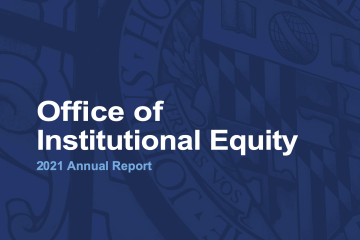The JHU Office of Institutional Equity is continuing to promote transparency in its work by releasing annual reports related to its processes and updated data on the types of complaints it receives, the various resolutions implemented, and the timeframes for investigations and other forms of complaint resolution.
OIE leads the university's efforts to foster an environment that is inclusive, respectful, and free from discrimination and harassment. This includes ensuring compliance with affirmative action and equal opportunity laws; investigating discrimination, harassment, and sexual misconduct claims; and serving as a central resource for employees with disabilities or constituents who require religious accommodations.
The 2021 report is now available on the OIE website, as are reports from previous years.
"We are pleased to provide this detailed insight into the work that we do on behalf of our community," wrote Shanon Shumpert, vice provost for institutional equity, in an introduction for the report. "The annual report illustrates our prevention efforts and our active commitment to fostering an environment that is safe, inclusive, and free from discrimination, harassment, and sexual misconduct."
New this year, the report includes a section that focuses exclusively on student data broken out from the overall data set. The section was added based on feedback from students.
"This addition reflects our ongoing commitment to hearing from our students and student-serving organizations," Shumpert said.
She noted that toward the end of 2021, as more students returned to campus after COVID-19 restrictions began to lift, complaints of sexual misconduct quickly increased. "Student sexual misconduct cases are increasingly complex, and we are constantly adapting to the challenges presented in this area," Shumpert said.
The 2021 report details the following:
- OIE received 697 reports in 2021. While this reflects an increase in reporting compared to 2020 (593 reports), it is still far fewer reports than received in 2019 (924 reports). Leaders said they believe these trends in reporting can be attributed to the COVID-19 pandemic. In 2020, most Johns Hopkins University community members learned and worked remotely for much of the year, contributing to the notable decrease in reporting that year.
- Complaints of disability discrimination rose slightly from 9% of the total reports in 2020, to 12% in 2021.
- Requests for disability-related workplace accommodations and religious accommodations saw a dramatic increase, attributable to the ongoing impact of the COVID-19 pandemic. Most accommodation requests were granted.
- 51% of the total reports received by OIE involved student complainants, and 59% of these reports involved allegations of sexual misconduct.
Shumpert added that the OIE team has sustained the improvements made in recent years to timelines for completing investigations under the Discrimination and Harassment Policy, but timelines for completion of investigations under the Sexual Misconduct Policy rose slightly in 2021, compared to 2020. She said this is likely because matters filed under that policy tend to be more complex, involve more parties, and may be subject to Title IX notice and due process requirements. In addition, sexual misconduct matters may also be subject to a resolution process that occurs outside of OIE.
"We will continue to look for opportunities to adjust our workflow in the interest of efficiency while maintaining quality," she said.
Members of the JHU community are encouraged to read the report for a more detailed breakdown of the office's efforts. The document also includes resources available to JHU affiliates, as does the OIE website, oie.jhu.edu. Anyone with questions about the annual report can email the office at oie@jhu.edu.
Posted in Student Life









